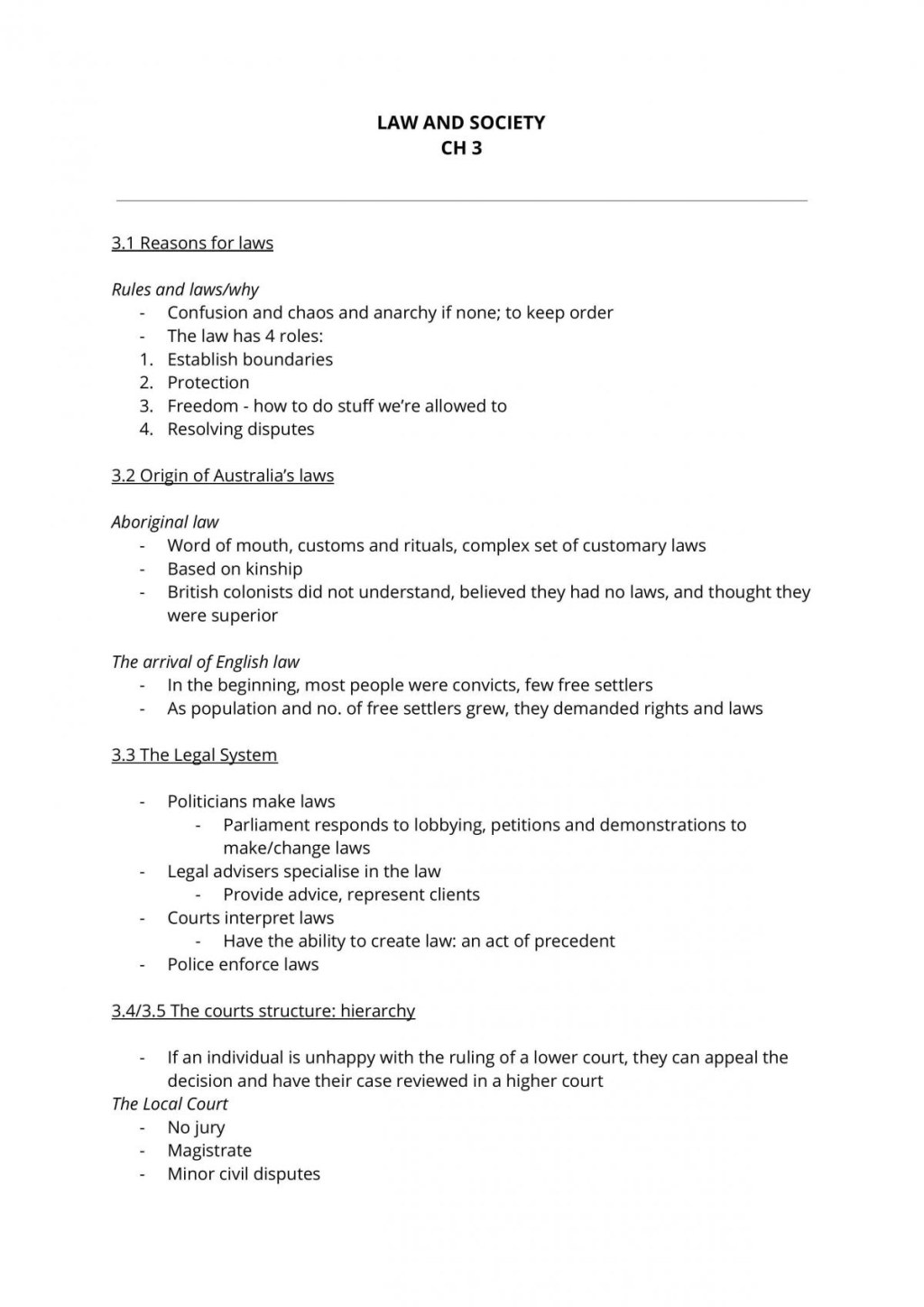Unlock Success With Law Society Rule 3.4: Your Guide To Thriving In The Legal World
Law Society Rule 3.4: Ensuring Ethical and Professional Conduct
Introduction
Dear Readers,
1 Picture Gallery: Unlock Success With Law Society Rule 3.4: Your Guide To Thriving In The Legal World

Welcome to another informative article where we delve into the details of Law Society Rule 3.4. This rule plays a crucial role in maintaining the ethical and professional conduct of legal practitioners. In this article, we will provide a comprehensive overview of this rule, its purpose, and its impact on the legal profession.

Image Source: thinkswap.com
So, let’s dive right in and explore Law Society Rule 3.4 in detail.
Overview of Law Society Rule 3.4
Law Society Rule 3.4 is a fundamental regulation established by the legal governing body to ensure that lawyers maintain the highest standards of professional conduct. This rule outlines the ethical obligations, responsibilities, and limitations that lawyers must adhere to in their practice.
By setting clear guidelines for lawyers, Law Society Rule 3.4 aims to protect the rights and interests of clients, promote public trust in the legal profession, and maintain the integrity of the justice system.
What is Law Society Rule 3.4?
Law Society Rule 3.4 is a set of guidelines and standards that govern the behavior of legal practitioners. It covers various aspects of professional conduct, including client representation, conflicts of interest, confidentiality, billing practices, and advertising.
Lawyers are expected to familiarize themselves with Law Society Rule 3.4 and adhere to its provisions throughout their careers. Failure to comply with this rule can result in disciplinary action, which may include sanctions or even disbarment.
Who Does Law Society Rule 3.4 Apply To?
Law Society Rule 3.4 applies to all lawyers who are members of the legal profession and are licensed to practice law. This rule encompasses lawyers in various practice areas, including litigation, corporate law, family law, and more.
Whether they are in private practice, employed by a law firm, or working in the public sector, all lawyers must abide by the ethical standards outlined in Law Society Rule 3.4.
When Does Law Society Rule 3.4 Come into Play?
Law Society Rule 3.4 comes into play from the moment a lawyer is admitted to the bar and continues to govern their conduct throughout their legal career. It applies to all interactions and engagements a lawyer has with clients, colleagues, the court, and the general public.
Lawyers must familiarize themselves with Law Society Rule 3.4 at the earliest stage of their legal education and ensure strict adherence to its principles to maintain their professional standing.
Where is Law Society Rule 3.4 Applicable?
Law Society Rule 3.4 is applicable in the jurisdiction where the lawyer is licensed to practice law. Different jurisdictions may have their own variations of this rule, but the underlying principles of ethical conduct remain consistent across the legal profession.
Whether practicing locally or internationally, lawyers must comply with the ethical standards prescribed by Law Society Rule 3.4 within their respective jurisdictions.
Why is Law Society Rule 3.4 Important?
Law Society Rule 3.4 is of paramount importance as it safeguards the interests of clients and upholds the integrity of the legal profession. By adhering to this rule, lawyers demonstrate their commitment to ethical practices, ensuring that their clients receive competent and diligent representation.
Furthermore, Law Society Rule 3.4 fosters public trust in the legal system by holding lawyers accountable for their actions and promoting transparency and fairness in legal proceedings.
How Does Law Society Rule 3.4 Impact Legal Practice?
Law Society Rule 3.4 has a significant impact on the daily practice of law. It guides lawyers in maintaining confidentiality, avoiding conflicts of interest, charging fair fees, and promoting professionalism in all aspects of their work.
By complying with Law Society Rule 3.4, lawyers create a positive reputation for themselves and their firms, leading to enhanced client satisfaction, increased referrals, and a thriving legal practice.
Advantages and Disadvantages of Law Society Rule 3.4
Advantages
👍 Enhanced client protection: By adhering to Law Society Rule 3.4, lawyers prioritize the best interests of their clients, ensuring they receive quality legal representation.
👍 Maintains professional standards: This rule sets a high benchmark for professionalism, preserving the integrity and reputation of the legal profession.
👍 Promotes trust and confidence: Law Society Rule 3.4 fosters public trust in the legal system, as clients feel assured that their lawyers are bound by ethical obligations.
👍 Prevents conflicts of interest: This rule safeguards against potential conflicts of interest, ensuring lawyers act in the best interest of their clients without any compromise.
👍 Upholds the justice system: By adhering to Law Society Rule 3.4, lawyers contribute to the fair and efficient administration of justice.
Disadvantages
👎 Restrictions on marketing: Law Society Rule 3.4 imposes limitations on advertising and promotional activities for lawyers, restricting their ability to market their services.
👎 Inflexibility in certain situations: In some cases, the application of Law Society Rule 3.4 may seem overly strict, limiting lawyers in providing certain services or engaging in specific activities.
👎 Potential disciplinary action: Failure to comply with Law Society Rule 3.4 can lead to disciplinary action, which may harm a lawyer’s professional standing and reputation.
Frequently Asked Questions (FAQs)
1. Does Law Society Rule 3.4 apply to all legal jurisdictions?
Yes, Law Society Rule 3.4 applies to lawyers in all legal jurisdictions. However, some jurisdictions may have additional rules or variations that lawyers must also comply with.
2. Can lawyers seek exceptions to Law Society Rule 3.4?
In certain situations, lawyers may seek exceptions or waivers to Law Society Rule 3.4. However, such requests must be justified and approved in accordance with the governing legal body’s guidelines.
3. What are the consequences of violating Law Society Rule 3.4?
Violating Law Society Rule 3.4 can result in disciplinary action, ranging from warnings and fines to suspension or disbarment, depending on the severity of the violation.
4. How often is Law Society Rule 3.4 updated?
Law Society Rule 3.4 is periodically reviewed and updated to align with evolving legal practices and emerging ethical considerations. Lawyers are advised to stay informed about any changes or amendments to ensure compliance.
5. Can clients file complaints against lawyers for violating Law Society Rule 3.4?
Yes, clients who believe that a lawyer has violated Law Society Rule 3.4 can file complaints with the appropriate legal governing body. These complaints are thoroughly investigated, and disciplinary action may be taken if the violation is substantiated.
Conclusion
In conclusion, Law Society Rule 3.4 serves as a vital framework for lawyers to maintain ethical and professional conduct in their practice. By abiding by this rule, lawyers uphold the values of integrity, honesty, and fairness, ensuring the trust and confidence of their clients and the public.
As legal professionals, it is our collective responsibility to embrace the principles of Law Society Rule 3.4 and contribute to a just and equitable legal system.
Final Remarks
Dear Readers,
We hope this article has provided you with valuable insights into Law Society Rule 3.4 and its significance in the legal profession. It is essential to understand and adhere to these ethical standards to maintain the highest level of professionalism in the practice of law.
Should you have any further questions or require more information, please feel free to reach out to us. We are here to support and guide you on your legal journey.
Thank you for your time and attention.
This post topic: Law and Society

